As important as an employee’s technical knowledge is, in any job or industry, technical skills are not enough to make any given individual excellent in their role or as the leader of a team.
This is where soft skills come into play. Employees must develop skills like communication, collaboration, and critical thinking to excel at their jobs and see career advancement.
As we continue to see hard skills (coding, data analysis, computer skills) become automated by AI and other emerging technologies, the value of soft skills is rising faster than ever for employers looking to hire. In their annual talent trends report, LinkedIn reported that 92% of talent professionals say soft skills matter as much, or more, than hard skills when hiring a new employee.
In this blog we provide an all-encompassing look into soft skills training for your employees, from what soft skills training is, to how it can make an impact on your employee and organizational performance. We touch on:
- What is Soft Skills Training
- Benefits of Soft Skills Training
- Examples of Soft Skills & Their Impact
- How to Develop Soft Skills in Your Employees
- E-learning and Soft Skills Training
What Is Soft Skills Training?
To start, it’s helpful to understand what the term soft skills encompasses. The Encyclopedia Britannica defines soft skills” as:
“Nontechnical and non-industry-specific skills applicable to a wide range of tasks across many roles and professions, including interpersonal skills or “people skills” that enable individuals to work effectively in groups and organizations.”
In the past few decades, organizations have slowly come to the realization that an employee with skills like effective communication, organizational and leadership skills is often more valuable than someone with only technical expertise.
Soft skills training can be delivered in many forms - e-learning/on-demand video courses, written assessments, in-person training, and seminars are all ways you can develop your employees’ skills.
You should keep in mind that just like learning a “hard” skill like coding, soft skills also require training, repetition, and practice to be mastered. You should always consider that certain ways of delivering soft skills training will give you and your team more flexibility to deliver, assess and get feedback on your soft skills training program.
Why Soft Skills Training Matters Today More than Ever
Soft skills have become far more important in determining employee success. Because of this, soft skills are no longer “nice to haves” for recruiters and talent teams; it’s something they’re actively looking for in new internal and external candidates.
A study conducted by The Stanford Research Center found that 85% of job success stems from soft skills and just 15% from technical knowledge or hard skills. Data like this should drive home the importance of incorporating soft skills training into your existing learning and development program.
As your employees continue to see how in demand soft skills are in today’s job market, the emphasis they put on working at an organization that offers this type of training naturally grows. Soon, organizations that don’t offer soft skills training as a benefit will have a hard time hiring and retaining top talent.
Benefits of Soft Skills Training
Increased Efficiency Within Teams
Training your employees on how to communicate in a professional, clear, concise, and empathetic manner will enable them to move projects forward much faster. Developing soft skills like effective communication prevents informational silos and helps employees communicate two key factors: their understanding of the directions they are given, and how they plan to execute those directions.
Most of us, at some point in our careers, have had a co-worker or employee whom everyone knew was very technically knowledgeable when it came to their role but struggled with effective communication. Had that person been given the training resources to improve soft skills like communication, collaboration/teamwork, and time management, they would’ve made a much bigger impact on the team’s ability to produce quality work efficiently, enabling them to stand out as a high performing employee and a high potential future leader.
Better Leadership
New and existing leadership training should be highly focused on soft skills development. Improving soft skills like emotional intelligence, active listening and how to have hard conversations will yield more well-rounded leaders. Well-rounded leaders will help make your employees happier by showing them that they are supported by their higher ups and can therefore trust them.
Think of that manager you once had – they were the best of the team at their job, they were technically knowledgeable and could answer almost any question thrown their way. Eventually, they became managers but didn’t have nearly the same level of success leading a team of people. Often, these new leaders are simply lacking the soft skills to communicate with their team efficiently and effectively to establish genuine relationships and tackle hard conversations with them.
If the right type of soft skills assessment is done early on, followed by training, these top performing employees could have the same level of success as leaders without such a steep learning curve.
Better Employee Retention
According to LinkedIn research data, 94% of employees say they would stay longer at an organization that invest in their career. Providing your employees with soft skills training resources tells them your organization cares about their career advancement, something that employees now see as a requirement to stay with a company long term.
Internally speaking, the more robust your employees’ soft skills are throughout the organization, the more you can minimize miscommunication, poor conflict resolution, dissatisfaction with management and other issues that often make people leave a company. Throughout our careers, we are likely to see an alarming number of highly valuable employees leave an organization. We have all seen that person who was an exceptionally good fit for the company and team and did an outstanding job but left after a year or two. Although someone leaving your company can’t be attributed only to a lack of training and career development opportunities up until now, you can count on the fact that the percentage of people leaving due to this gap in your training program will continue to increase exponentially every year, if left unaddressed.
Examples of Soft Skills and Their Impact
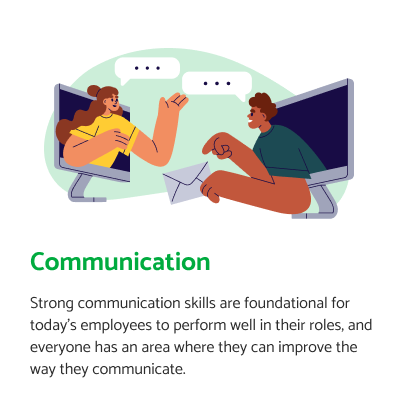
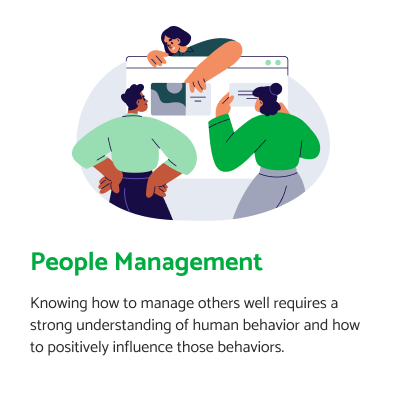
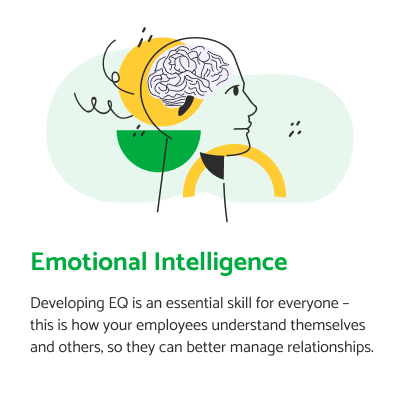
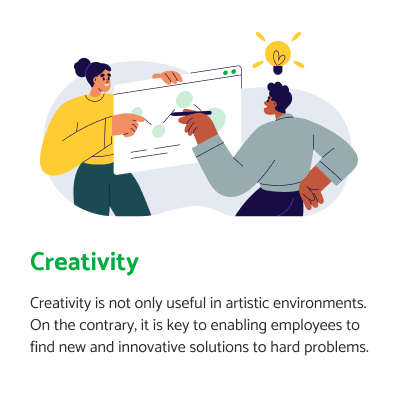
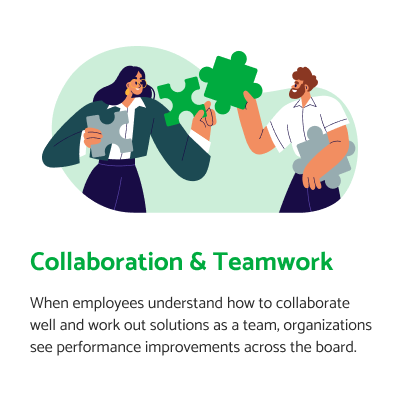
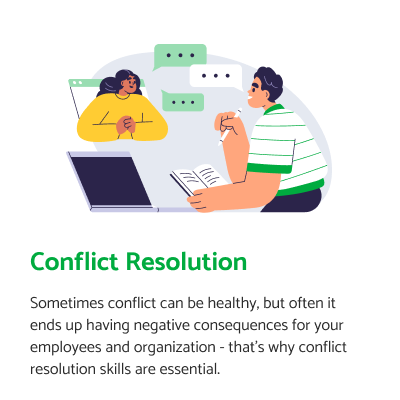
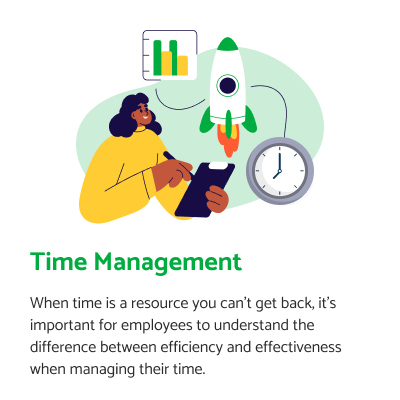
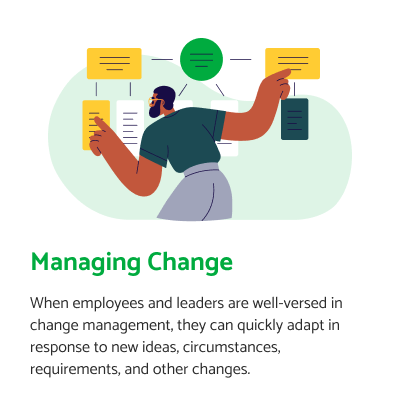
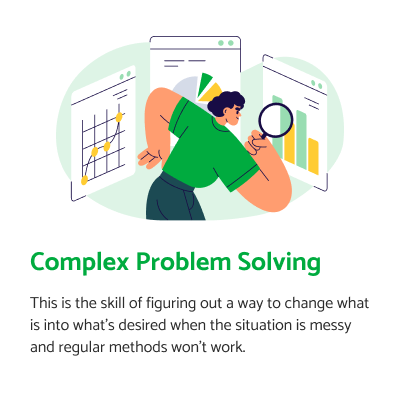
How to Develop Soft Skills in Your Employees
1. Assess Your Employees' Soft Skill Gaps
A good first step to take when incorporating soft skills training into your L&D plan is to assess where your employees stand as far as soft skills are concerned.
One of the biggest challenges L&D teams run into when evaluating soft skills is the lack of skill gap analysis tools that are specifically designed to look at business skills. This is mostly because most of the skills assessment resources available have been made with the purpose of assessing hard skills or technical knowledge.
BizLibrary’s free Soft Skills Assessment is a great starting point for your employees and leaders to self-assess their levels of proficiency when it comes to various soft skills. We also address the soft skills gap and touch on specific training strategies to address it within your organization in our ebook.
Once you have assessed your leaders and individual contributors’ soft skills, it will be much easier to incorporate their specific needs into their custom learning paths.
2. Educate Your Organization on the Importance of Soft Skills Training
Educating the entire organization on what soft skills are and why they are so important in today’s workforce should be done early on.
Sending out informational emails and posting on internal communication boards like Slack or Teams with regularity, can be great ways to educate everyone in the organization about how business skills training can positively impact their careers.
It’s also important to tailor the resources you send out to different stakeholders. Remember that one of the main goals of spending time and resources on sending out educational materials on soft skills is to encourage leadership buy-in for the program, if it’s not already present.
3. Incorporate Soft Skills Training Resources into Your Training Programs
Depending on what your current employee training and development program looks like, you’ll need to incorporate soft skills specific training materials into your L&D strategy.
If your organization already uses an LMS or HRIS system, off-the-shelf content can be a great way to continue to reap the benefits of the on demand video training format and possibly introduce a more engaging approach to e-learning like microlearning formatted modules.
If you do not have an LMS or other type of online learning platform this is a great opportunity to start a conversation about the positive impact and ROI that incorporating an online training solution can bring to your organization.
4. Market Soft Skills Training as Part of Your Learning & Development Strategy
Assessing, educating, and bringing in the resources to enhance your employee’s business skills might seem like enough, but it’s also crucial to promote your program both internally and externally.
Internally, marketing your soft skills training program is crucial to getting employees exited and eager to interact with the training resources you’re providing them. Coming up with creative incentives like small prices for the individual that completes the most soft skills learning modules in a one month or logs the most time in the LMS are all great ways to drive engagement and utilization for your program.
Externally, it’s equally crucial to clearly promote that your organization offers this type of training resources to all new employees through your job postings and interview process. As we’ve seen throughout this article, employees are looking for development opportunities more than ever when searching for new job opportunities. Promoting your soft skills training program can be a great way to attract top talent to your organization.
Elearning and Soft Skills Training
When you know that soft skills training is important to include in your training program, the question is then, “How do we deliver this in an effective way?”
Some would say that learning soft skills can only be accomplished through experience, when you’re in the thick of things, working side by side with your colleagues. While that’s certainly necessary for putting soft skills into practice, today’s learning technology plays a significant role in teaching employees to understand these abstract concepts and make sense of how to implement them on the job.
Video-based microlearning and online interactive learning are effective ways to deliver complex corporate soft skills training for employees because training can be done in short, engaging bursts, and then practiced in real-life situations right away. This makes online learning highly efficient and cost-effective for subjects like communication training, business etiquette, presenting, time management, ethics, and more.
Breaking down complex topics into manageable chunks also makes training much more accessible than if you relied only on instructor-led training sessions to teach these soft skills. Online, on-demand content is a powerful tool for delivering effective soft skills training, especially when you use it in conjunction with on-the-job coaching and training scenarios.
Providing an online learning library full of expertly created content can improve your company culture because it allows your employees to self-direct their development. This capability empowers them to make learning and growth a part of their everyday life at work.
Upskilling and Reskilling Tools for Soft Skills
Utilizing an AI-powered online learning tool that integrates video based microlearning and interactive content could be a game changer for many organizations.
A tool specifically made for upskilling and reskilling employees will allow you to carry out key elements of soft skills training while drastically reducing your lift as an L&D professional. Some of these elements include:
- Delivering conceptual knowledge of what each soft skill is and how it’s important in the workplace.
- Providing employees with examples, reenactments, and real-life scenarios where they will have to apply that certain soft skill.
- Assessing employees’ competency and mapping them to the soft skills that matter most to their roles and ones they need to work on the most.
- Viewing your employees’ progress on their soft skills training modules, assigning new learning modules, and collaborating with each employee on their professional development.
Closing Thoughts
Soft or business skills are becoming the focal point of all talent teams when looking to attract top talent to their organization. Yet, most organizations are struggling to understand the value of incorporating this type of training into their L&D programs and how to do so.
As we continue down a path of automation and letting highly technical task be carried out or assisted by tools like generative artificial intelligence, developing your employees’ soft skills will be the single most important factor in determining how successful and future proof your organization will be.

